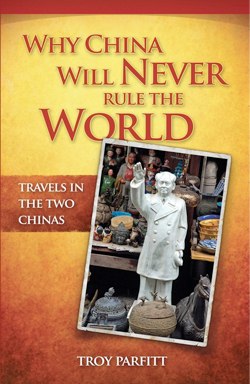
As he hits most of the tourist spots in China, he often complains about the way the Chinese do not look out the window or how they do not read enough. He laments the constant haranguing he receives as a Western tourist, the “harlo” cat calls and the touts trying to cheat him. For four hundred pages, he piles up these complaints without really making any point. The title suggests that he is going to use his observations to answer questions about China’s future role in the world, but, he fails to even begin to answer the question that he sets out to answer. Instead, the reader is left with pages of his anger at the Chinese and little more. Parfitt seems to think that his complaints are enough for evidence that China will never rule the world, though he hardly tries to make that argument.
Parts of Parfitt’s book do make for great reading. In general, it is a nice contrast to the encomiums pouring out of publishers with only praise for China. Parfitt takes on the task of seeing if China is actually all that people make it out to be, and he decides that it fails.
At some points, Parfitt’s prose is vivid, and his descriptions of the landscapes are compelling. Lines like “unfurled fields of swaying jade adorned with brick homes and formations of karst, the craggy, luxuriant mountains” transport his readers to China. At some points, he is genuinely funny, but sometimes, he tries too hard to be funny.
Parfitt’s strongest point comes when he details his discussions with the Chinese people he meets while traveling. These discussions are animated and often say a lot about the country. In one episode, Parfitt meets a woman who teaches Chinese to Korean students. The teacher finds it so strange that her Korean students have so much money compared to the Chinese even though the Koreans, in her words, simply copied Chinese “culture and language.” These episodes reveal what individuals in China really think, and these passages are the most important contribution this book makes to the on-going discussion of China.
However, the book’s shortcomings dim these strong points so much that they are hard to see. Though this is Parfitt’s second book, he is not a good writer. Parfitt’s four hundred pages are written more like a book report than an actual book. The book is filled with clichés and bad writing. This bad writing is compounded by the fact that little editing was done. We get to learn what he eats for breakfast, lunch and dinner, plus what he watched on television before bed on most days of his trip. If he ate something interesting each day, this would not be a problem, but, in most cases, he is simply wasting a page detailing his trip to the local McDonalds. Granted, this is not entirely Parfitt’s fault. A good editor would have cut much of this and worked to improve his writing.
Furthermore, Parfitt bounces from one topic to the next seemingly at random, starting a paragraph with one topic and, before finishing with that topic, moving on to another. Parfitt’s jumping from one topic to the next makes it difficult to figure out what point he is trying to make, and, for this reason, the book seems ever wandering in search of some new topic, never making a point about the topic it just picked up.
Finally, the most problematic part of this book is Parfitt’s inability to adapt culturally. He really seems to despise the Chinese, which is strange considering he spent over a decade living in Taiwan. “… and not even the multitudes of Chinese tourists, their idiot grins and derisive greetings could dampen [my mood], although they definitely tried.” Though he is able to have interesting conversations with individual Chinese people, he is never able to overcome his general dislike of the Chinese populace.
At one point in the book, he engages in a discussion with students about New Zealand. His students, Parfitt realizes, did not want to visit the country because pictures of New Zealand all showed scenes that were beautiful yet devoid of human beings, something that Parfitt thinks makes it a fantastic destination. “Nothing frightens the Chinese quite like the prospect of isolation.” He continues the rest of the page excoriating the Chinese for daring to value isolation and human contact differently than he does, for daring to think differently than Troy Parfitt does.
Parfitt fails to adapt to Chinese culture. From what he has written, he seems to hate almost everything about it because it does not align with his value system. Parfitt has missed what makes travel so delicious, being confronted with values and situations that we are not used to and forcing ourselves to adapt to them.
He may be right about China not being able to rule the world, or he may be wrong. Reading his book will not answer that question because he is not able to come to terms with the Chinese. He constantly seems to seek out fights with the Chinese. He never gets beyond the most basic book-learning of Chinese culture, leaving his description of the country and the problems which it is facing (and this reviewer agrees with Troy Parfitt – China has many problems) flat and of little value to someone wanting to understand China. This book has some positives, particularly at the points in which Parfitt does engage with Chinese people, but, for the most part, the author cannot help the reader understand China because he never tries to understand China himself.
- Get a universal plug adapter
- Get a Car Rental
- Buy Travel Insurance
- Search for Great Tours HERE
- Book Your Accommodation HERE
- Get an eSim to be able to use your smartphone abroad.

 Intrepid Travel China – Review of China Highlights Tour (Beijing, Xi’an, Suzhou, Shanghai)
Intrepid Travel China – Review of China Highlights Tour (Beijing, Xi’an, Suzhou, Shanghai) Traveling Behind the Great Firewall of China
Traveling Behind the Great Firewall of China Book Review: “Thailand Surprise” by Coco Bijou
Book Review: “Thailand Surprise” by Coco Bijou Book Review – Wanderlust and Lipstick: For Women Traveling to India
Book Review – Wanderlust and Lipstick: For Women Traveling to India

DG Cayse
Says:December 20th, 2011 at 5:12 pm
Although Mr. Moore mentions the objective position Mr. Parfitt assumes by his not failing into the “China Trap” in his observations, Mr. More fails to see that it is this exact fact that he later uses to castigate Mr. Parfitts book.
Mr. Parfitts’ “…inability to adapt culturally.” is exactly what allows his objectivity to come through.
By remaining ‘outside looking in’ Mr. Parfitt has provided a clearer view of the mainland Chinese culture, warts and all, for reader consumption.
DCook
Says:December 20th, 2011 at 6:57 pm
After having followed the conversation Parfitt is having with others on Taiwan’s expat forum, Forumosa, I’m inclined to think your general conclusion might well be correct. Parfitt doesn’t really get the Chinese in any nuanced fashion. I think his book will likely resonate with many, nonetheless, in it’s disdain for the Chinese. It’s a shame he wasn’t able to lead us through that disdain to a more thoughtful and open position.
Oh, and by the way, that disdain is shared by many Taiwanese whose heritage and contemporary world is rather different than China’s. To simply equate Chinese and Taiwanese, as you do in your review, is to show some of the same lack of knowledge and nuance as Parfitt.
Lee Moore
Says:December 21st, 2011 at 8:58 am
As a response to the two welcomed comments left on my review, I would like to respond to Mr. Cook first.
I recognize that many Taiwanese share Parfitt’s disdain and see themselves as distinctive from Mainlanders. However, I would argue that the Taiwanese are, though distinct, very similar to Mainlanders. I’m sure that many Taiwanese would disagree with me, but these are issues of perspective, not fact, therefore, my statement does not reflect my ignorance, but simply a difference of opinion.
In response to Mr. Cayse, I think that your argument does not hold water. You suggest that Parfitt is able to understand Chinese culture better than others because he is not taken in by it, because he does not understand it.
Following your logic, I, as someone who cannot read Arabic, can more objectively see Arabic Literature for what it really is, just a bunch of squiggly lines. Unlike a scholar who went to the trouble to learn the Arabic language and come to terms with Arab culture, I have not fallen into the “Arabic Trap”, and can provide a clear, objective perspective of Arabic Literature, warts and all, as I talk about how all the squiggly lines in Arabic books make me feel.
No, in fact, one can find fault with Chinese culture, but first, one has to come to terms with that culture if one wants to say anything valuable about it. Parfitt is as objective a commentator on Chinese culture as the Spanish Conquistadors were on native Amer-Indian cultures. Neither understood the culture they commented on. Instead, they simply formed a moral judgement of the culture based on their own culture’s values without trying to really come to terms with the other cultures.